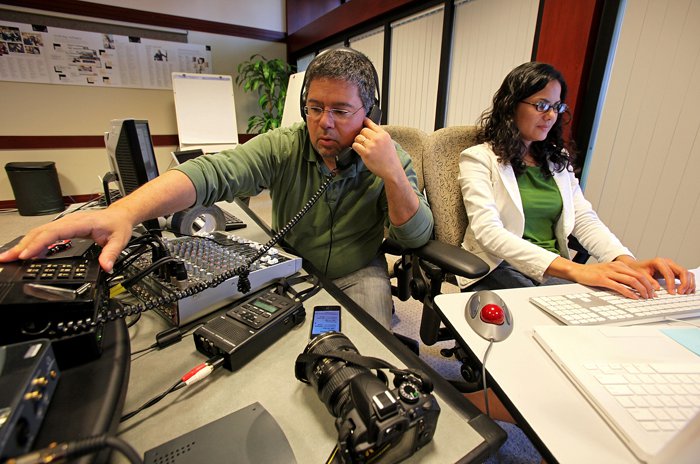
Media books in a networked, digital journalism universe, Part 2
News University celebrates its 100th webinar. Photo credit: Kenny Irby / The Poynter Institute
Last week, I wrote about the steady stream of books by Knight Foundation journalism and media innovation partners. Here are some more highlights:
· Steve Brill’s latest book, Class Warfare, focuses on a La Brea Tar Pit of public policy, our messy education system. The New York Times review begins with a good summary: “Steven Brill a graduate of Yale Law School and the founder of Court TV, and in his new book, “Class Warfare,” he brings a sharp legal mind to the world of education reform. Like a dogged prosecutor, he mounts a zealous case against America’s teachers’ unions. From more than 200 interviews, he collects the testimony of idealistic educators, charter school founders, crusading school superintendents and billionaire philanthropists. Through their vivid vignettes, which he pieces together in short chapters with titles like “ ‘Colorado Says Half of You Won’t Graduate’ ” and “A Shriek on Park Avenue,” Brill conveys the epiphanies, setbacks and triumphs of a national reform movement. “
One of the positive aspects of doing the book, Brill told me, was his discovery of a couple of excellent nonprofit news organizations writing about education issues, Gotham Schools, and Education News Colorado.
Brill is a long-time partner of Knight in our work at Yale, where the Knight Law and Media Program and Knight Professor Jack Balkin are the leading forces helping advance freedom and journalism in the 21st century by educating the next generation of media lawyers.
· Speaking of the tar pit of education bureaucracy, the latest edition of Journalism and Mass Communication Educator contains an “editor’s note” detailing the hassle Poynter’s News University at two “partner” universities.
What’s NewsU? It’s the nation’s most popular e-learning site for journalists, with hundreds of courses, dozens self-directed, and more than 210,000 registered users. Foundation investments launched NewsU and helped it expand. (Disclosure: I’ve provided NewsU content: The Newseum allowed the ‘Be a Reporter’ and ‘Be an Editor’ games I had co-developed there to be used by Poynter, and my wife, Mary Ann Hogan, and I developed the self-directed class News Sense, “the building blocks of news.” The ‘Be a Reporter Game’ and News Sense remain among NewsU’s most visited offerings.)
Many journalism and communications schools see NewsU as an obvious way to add to what they do. But when the modest program at Missouri State (partnered with NewsU to help develop its Journalism 101 course, this drew charges of “outsourcing” from teachers outside of the communications school who said e-learning meant “losing control.” A similar thing happened at California State University at Fullerton where the academic senate investigated and the union complained. There, the chancellor stepped in to allow the partnership. Thankfully, other Poynter partners, including Florida Atlantic University, see no controversy in trying new tools that might help them keep up with the fast-moving digital age.
Through the Carnegie-Knight Initiative for the Future of Journalism Education, Knight promotes what we hope are a growing number of schools that want to be more relevant in the digital age.
Recent Content
-
Journalismarticle ·
-
Journalismarticle ·
-
Journalismarticle ·


